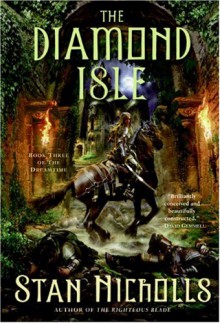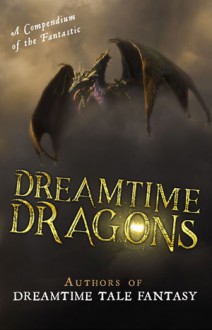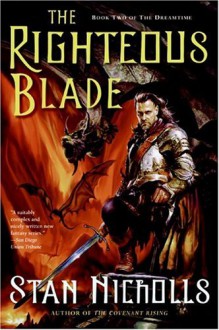
The final book of this trilogy (
The Diamond Isle), was better than the middle book (
The Righteous Blade), but not as good as the first one (
The Covenant Rising). The ubiquity of magic replacing modern technology in a medieval setting continued to be an issue. It was jarring in the first book, wearing in the second, and by this book I'd somewhat accepted it. Because the rest of the trilogy is well written, I kept trying to make sense of the approach - for example, in this last book, it occurred to me that maybe Nicholls was re-creating space opera battles using ocean frigates - but none of my attempts really worked. What was clear was that Nicholls was inspired by post 9/11 real-world events to make some fairly direct points about civil liberties versus security, etc - direct enough to pull me out of the book, and wonder again about the purpose (e.g., was the entire trilogy a satire or parable? I decided not).
Taking the story for its own sake, then, as a fantasy: It could have been stronger. As is often true with series or big books, what you expect to find at the end isn't always what you get. In this case, I expected Nicholls to deal with big questions about the Founders, the Dreamtime, magic, and the nature of the universe. He provides bland answers to the first two, and skips the others almost entirely. Instead, the trilogy is about politics and individuals. The latter is often overlooked in epic fantasy, and I give Nicholls credit for addressing it here. Unfortunately, he doesn't carry through the strong characterization from book 1. For example, in book 2, several characters casually fall in love, and there's a terrible betrayal. In this book, we have to take for granted that casual love has turned into deep passion. The betrayal fades from a severe shock to a constant repetition of "I wish I hadn't done that." Despite a long setup, Nicholls doesn't wring from the situation the turbulent emotion and difficult choices that he could have.
Many of the deeper questions get pretty off-hand answers. For example, Reeth has been searching for something since book 1. Near the end of this book, he heads off, finds it right away, and casually walks in with "we must have been destined to find it, and that's why no one else did." It's pretty unsatisfying. Similarly, the fearsome warlord Zerreiss has been just off-screen for most of the trilogy. During book 2 and especially book 3, he keeps doing amazing that is kept from the reader. At the very end of the trilogy, this special effect, which until now has affected one city at a time, suddenly covers two entire empires. And then he walks off into the sunset.
Where book 1 was 3.5 stars, this one was 2.5. The writing was quite good, but the wrapup was disappointing.
In looking at the trilogy overall, I quite enjoyed book 1,
Covenant Rising, but I can't really recommend the whole series.


 Log in with Facebook
Log in with Facebook 









